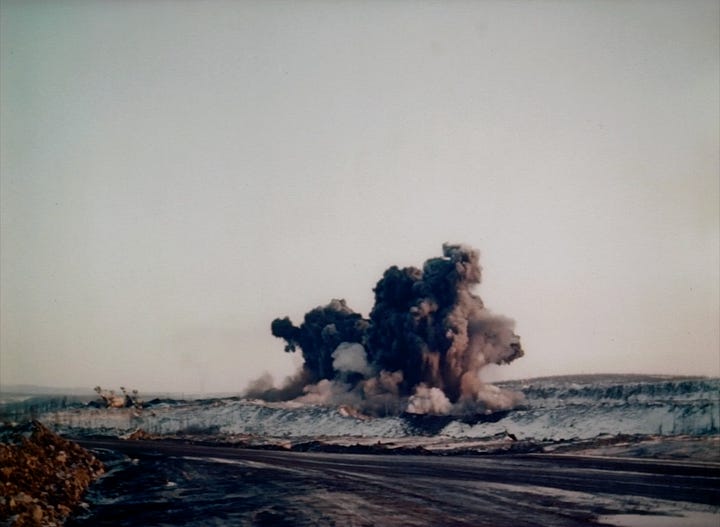Russian Colonialism 101 is the first newsletter to shed light on Russian colonialism. It is part of the Volya Hub network, expanding global awareness of Russian colonialism.
I planned this post before the newsletter went on hiatus. Many of you have reached out since then, expressing your regret and support; thank you so so so much. While I am looking for the funds to resume the newsletter, I hope this extra post will be of use and comfort to you.
Art is the best shortcut for understanding the Russian colonial nature. That’s why I am a massive fan of Ukrainian director Oleksiy Radynski, who is a master at this task. His work and his views on ending Russian colonial violence are truly trailblazing. I am so glad that two of his recent films hit global streaming.
CHORNOBYL-22
The Chornobyl nuclear catastrophe is the most harrowing monument to Russian imperial incompetence and colonial disregard for nature. It was also a source of massive anti-colonial awakening for Ukrainians. In many ways, it paved the way for ending the Russian occupation of Ukraine in 1991 (check out the episode from our latest Ukrainian Spaces season devoted to this story).
Back in 1986, only the remarkable heroism of Ukrainians who sacrificed their lives prevented Europe from turning into a radioactive wasteland. As Russians encountered no accountability for this grave colonial crime against humanity in history, in 2022, they returned to the scene of the crime and nearly precipitated another nuclear catastrophe. Once again, only the resistance of ordinary Ukrainians stood in their way. The Ukrainian director Oleksiy Radynski captured the 2022 Russian occupation of the Chornobyl exclusion zone in his double documentary Chornobyl-22 (2023) and Special Operation (2024). The first focuses on the testimonies of the workers at the Chornobyl Nuclear Power Station who survived this terror and prevented the Russians from causing another nuclear catastrophe. Meanwhile, Special Operation is an exceptional zero-narrative documentary that portrays the occupation through a montage of unfiltered CCTV footage, which Ukrainians risked their lives to preserve.
Both Chornobyl-22 and the Special Operation document expose the absurdity and utter evilness of the Russian occupation. But they are also one of the most unusual war documentaries you will ever see, using digital voyeurism to expose the jarring incompetence of Russian imperial troops. With Europe’s largest nuclear plant in the Zaporizhzhia region remaining under Russian colonial occupation, these documentaries are a grim reminder that we are all living on borrowed time.
WHERE RUSSIA ENDS
Where Russia Ends is such a punchy, brilliant piece of anti-colonial art that we planned to feature it in our immersive Russian Colonialism 101 book show (which didn’t materialise because of failed fundraising), it has also won numerous awards worldwide, including the main prize at the 2024 Kyiv International Short Film Festival and Best Short Film at the Riga International Film Festival.
Radynski employs a mockumentary style to narrate the tale of an unnamed Ukrainian director who undergoes a sudden self-decolonisation awakening while filming a propaganda documentary in North Asia during the mid-1980s. The footage is authentic and was recently discovered in a Kyiv archive. The facts in the short movie are also real and come from a book, ‘The Destruction of Nature in the Soviet Union’, which I featured in this newsletter last year. Authored anonymously by Ze'ev Wolfson, an environmental scholar from a Crimean Jewish family, the work was leaked abroad under the pen name Boris Komarov. The only fictional aspect in this short film is the Ukrainian narrator, although her self-decolonisation experience is portrayed so accurately that any Ukrainian can relate.


Where Russia Ends is a story about the sadistic disregard for nature by Russian colonialism, the intentional poisoning of indigenous lands, and the full-on death cult of mutilating the environment. Non-Russian lands would (and still are) face disproportionately bigger fallout from Moscow-fueled environmental violence. Settler colonialism always drives it. But Where Russia Ends is also a story about how little we know about the true extent of Russian colonial violence.
Chornobyl-22 and Where Russia Ends are available globally with English subtitles via the Ukrainian streaming platform Takflix. Use promo code "eristavi" for a 15% discount on screening these films.
I made this post together with TAKFLIX, the only streaming service for Ukrainian movies. It is our non-paid collaboration since I never take money for promoting cool Ukrainian businesses and consider it another way to support Ukrainian resistance, especially if they channel revenues to power up Ukraine’s frontline against Russian genocidal imperialism.
Takflix is available outside of Ukraine and has a lot of subtitled content. Unlike foreign platforms, it sends a whopping 50% of its profit to the creators and an additional 10% to Ukraine’s largest humanitarian aid hub, Come Back Alive.
By streaming Ukrainian movies, you not only support Ukrainian anti-colonial resistance but also literally fund it.
the empire will fall 🪆🪓








Use extreme caution w/ takflix movie site. It causes “internal WebKit error” on Firefox, and consistently crashes Brave browser to the point that restarting the app causes strange behavior - I reboot the entire system. It feels like something other than a simple “website bug / error”.
Your posts as well as others subscribed to don't show up in my notes/feed, although liking recent posts. Substack's chat gives nonsensical answers.